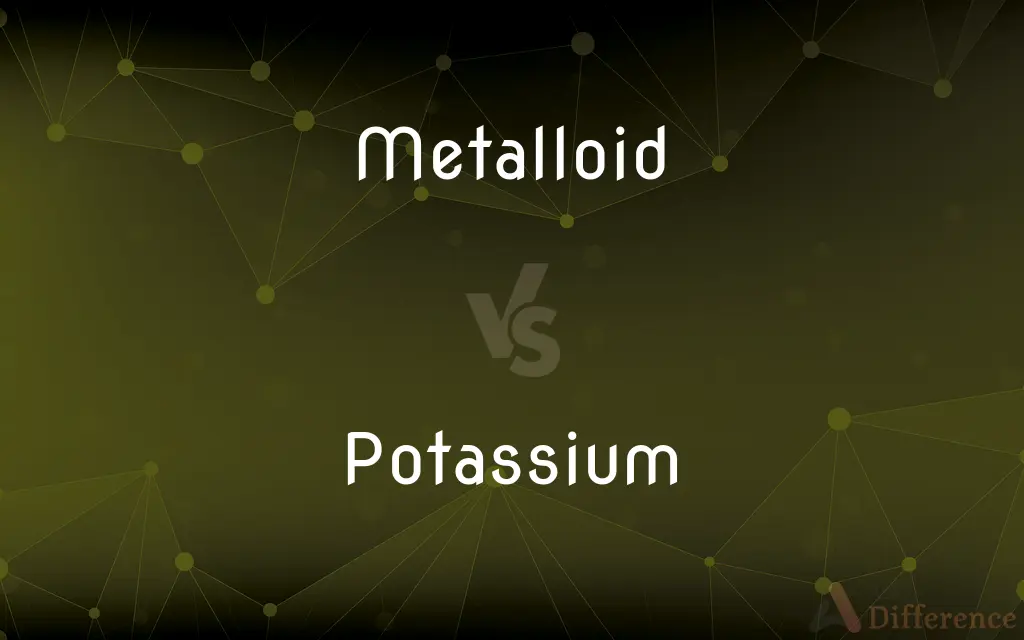Metalloid vs. Potassium — What's the Difference?

Difference Between Metalloid and Potassium
ADVERTISEMENT
Compare with Definitions
Metalloid
A metalloid is a type of chemical element which has a preponderance of properties in between, or that are a mixture of, those of metals and nonmetals. There is no standard definition of a metalloid and no complete agreement on which elements are metalloids.
Potassium
Potassium is a chemical element with the symbol K (from Neo-Latin kalium) and atomic number 19. Potassium is a silvery-white metal that is soft enough to be cut with a knife with little force.
Metalloid
A nonmetallic element, such as arsenic, that has some of the chemical properties of a metal. Most metalloids behave as semiconductors.
Potassium
A soft, silver-white, extremely reactive element that is an alkali metal, is essential to plant and animal cell functions, and occurs in nature only in compounds. It can be obtained by electrolysis of its hydroxide and is found in, or converted to, a wide variety of salts used especially in fertilizers and soaps. Atomic number 19; atomic weight 39.098; melting point 63.5°C; boiling point 759°C; specific gravity 0.86; valence 1. See Periodic Table.
Metalloid
A nonmetallic element, such as carbon, that can form an alloy with metals.
ADVERTISEMENT
Potassium
A soft, waxy, silvery reactive metal that is never found unbound in nature; an element (symbol K) with an atomic number of 19 and atomic weight of 39.0983. The symbol is derived from the Latin kalium.
Metalloid
Relating to or having the properties of a metalloid.
Potassium
(countable) A single atom of this element.
Metalloid
Having the appearance of a metal.
Potassium
An Alkali element, occurring abundantly but always combined, as in the chloride, sulphate, carbonate, or silicate, in the minerals sylvite, kainite, orthoclase, muscovite, etc. Atomic weight 39.0. Symbol K (Kalium).
Metalloid
(chemistry) An element, such as silicon or germanium, intermediate in properties between that of a metal and a nonmetal; especially one that exhibits the external characteristics of a metal, but behaves chemically more as a nonmetal.
Potassium
A light soft silver-white metallic element of the alkali metal group; oxidizes rapidly in air and reacts violently with water; is abundant in nature in combined forms occurring in sea water and in carnallite and kainite and sylvite
Metalloid
The metallic base of a fixed alkali, or alkaline earth; applied to sodium, potassium, and some other metallic substances whose metallic character was supposed to be not well defined.
Metalloid
(not comparable) Of or relating to the metalloids.
Metalloid
(informal) Characteristic of the metal music genre.
Metalloid
Formerly, the metallic base of a fixed alkali, or alkaline earth; - applied by Sir Humphrey Davy to sodium, potassium, and some other metallic substances whose metallic character was supposed to be not well defined.
Metalloid
Having the appearance of a metal.
Metalloid
Having the properties of a nonmetal; nonmetallic; acid; negative.
Metalloid
Of or being a nonmetallic element that has some of the properties of metal;
Arsenic is a metalloid element
Share Your Discovery

Previous Comparison
Abstract vs. Concrete
Next Comparison
Nefarious vs. Wicked













































